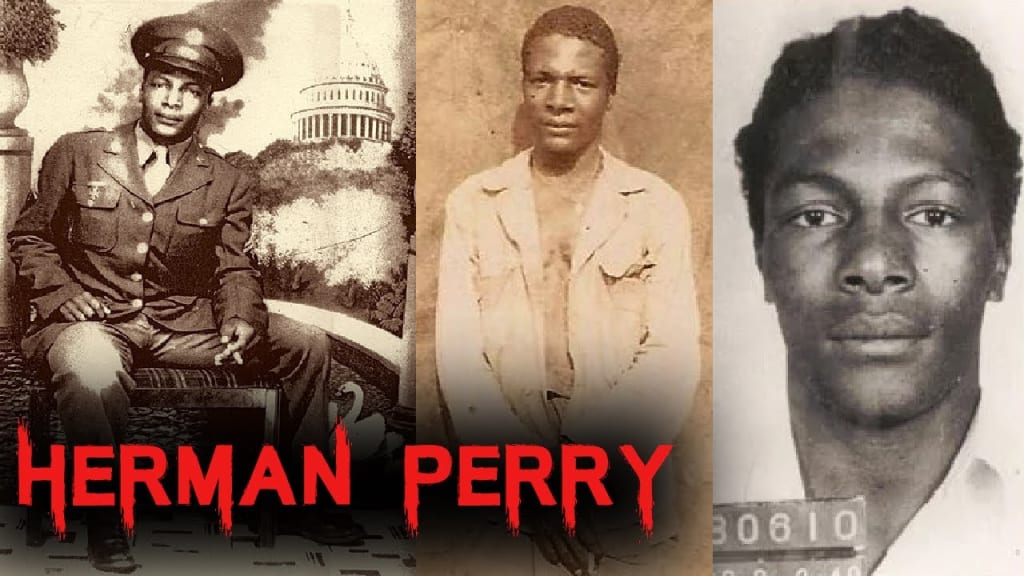Jungle Legacy: A Soldier's Odyssey
One Man's Journey Through the Wilderness, Love, and Honor

March 5, 1944 - The Burmese jungle - US Army 849th Engineer Aviation Battalion Camp
"Get back!" yelled twenty-one-year-old Private Herman Perry. He stood in the road brandishing his M1 Garand rifle.
Lieutenant Cady ignored the warning and stepped closer. Sweating, sobbing, probably coming off an opium high, Perry was losing it; having a breakdown. He wasn't going to let Cady take him into custody. He wasn't going to do more time at that parasite-infested hellhole known as the Ledo Stockade.
Despite Perry's erratic behavior, Cady wasn't about to back off. This boy had a smart mouth, he had been AWOL—he was a troublemaker. He needed to be punished. Besides, there was no way that Perry would shoot—that would be suicidal...
Now less than a foot away from Perry, Cady stretched out a hand towards him... BAM! Cady jerked and crumpled to the ground. For a split second, everyone stared in disbelief at the fatally wounded Cady. Then Perry swung his gun around and trained it on the other officers as he backed away down the road. As he neared the trees, he turned and ran, vanishing into the brush.
During World War II, the United States segregated its Armed Forces. Sure, there were a couple of African American combat units created mainly for political reasons, but the majority of African Americans who served were relegated to menial tasks, including cooking, cleaning, and construction. That's how close to 10,000 African Americans ended up being shipped to Burma.
These men are stationed there to build what will end up being a boondoggle—a 1,072-mile (1,726 kilometer) supply road to run through the Burmese jungle, connecting Ledo, India, to Kunming, China. Some 5,000 white Americans are also sent to work on the Ledo road, however, many of them are officers overseeing the black soldiers.
The Burmese jungle is torturous. It's hot, humid, the vegetation's dense, the terrain rough. It's easy to get malaria or dysentery, and hard to avoid the leeches, lice, and mosquitoes. Even worse, sometimes man-eating tigers lurk in the brush. Clothes rot and the food rations are poor.
Building the Ledo road is backbreaking—far harder than Perry's North Carolinian childhood of picking cotton in a sharecropping family. The soldiers have mandatory 16-hour shifts. Bulldozers supplied by the Army quickly break down, and the GIs are forced into manual labor. They use hoes and pickaxes to dig the muddy, rocky red soil.
Many of the black soldiers work side by side and become friendly with coolies—unskilled native laborers. As a result, black soldiers pick up bush lingo, Urdu, and Hindi. They trade in the local black markets for moonshine known as jungle juice. Some soldiers, including Perry, seek solace from the grim drudgery of their lives in opium and marijuana.
When Cady was attempting to take him into custody, Perry was coming off a 2-day drug bender. After shooting Cady, a panicked Perry runs into the jungle. Oh God, he killed someone! For 3 days, Perry stumbles through the jungle in a daze. Not knowing what to do, he veers back to the Ledo Road.
He runs into some soldiers from a different unit working on the road. They feed him and pass along messages from his friends in the 849th Battalion—Military police are looking for him. Perry decides to surrender. At nightfall, he stands by a bridge for the Namyung River. Sooner or later, a patrol will come by and he'll turn himself in.
While waiting, Perry sets down his rifle. Hearing gunshots somewhere nearby, Perry gets worried the MPs are gunning for him and they'll kill him outright instead of arresting him. Spooked, he slips into the jungle again, accidentally leaving his gun behind.
Perry spends several days wandering in the jungle. Luckily, he speaks some bush lingo which allows him to beg for rice from Naga farmers. The Naga are an ethnic group native to Northeastern India and Northwestern Burma. Some of the tribes live remotely and stick to traditional practices... including headhunting. For the most part, the British and Americans ignore the Naga, as long as they stick to making war on each other and not Westerners.
March 18 - Around 2 weeks after he had killed Cady and fled into the jungle, Perry runs into some British troops. Perry, who's always been a smooth talker, thinks fast and makes up excuses as to why he's alone in the jungle. He's able to charm the Brits into giving him some food rations.
It's hard going trekking through the remote Patkais foothills, but the farther away Perry gets from the Army, the better. One day, Perry's hiking up a dense mountain slope when he sees something spine-chilling. A basha or temporary shelter often made with bamboo. This basha is decorated with human skulls to which water buffalo horns have been attached.
Perry has stumbled into the headhunting Naga village of Tgum Ga. Believe it or not, Perry delights the villagers by giving them the remaining canned food rations he got from the British. The Ang or village chief invites him to be his honored guest. Perry takes a liking to the Chief’s 14-year-old daughter; she seems to return his interest. Perry has a new problem.
How do you flirt with a girl and impress her warrior father when you don’t know the culture or speak the language? The answer is gifts. Perry hikes some 8 miles down the mountain back to the Ledo road. Somehow he manages to get ahold of a load of Army goods. Most importantly, he gets an M1 Garand. In Naga culture, tiger pelts and claws are prized. The act of killing a tiger is seen as a virile feat of masculinity. Compared to the clubs and flintlocks the Naga have, with his modern gun, Perry is seen as having the ability to kill many a tiger.
The village is impressed, Perry is considered an important man and the chief allows Perry to marry his daughter. The first few months of Perry’s married life are pretty good. He struggles with malaria, but due to his stockpile of Army rations, he’s rich enough to hire servants to work his fields. Perry spends much of his time hunting monkeys and tigers. He grows fluent in his wife’s language. The couple is excited to find out that they’re expecting their first child. Many nights the tribal musicians play flutes and drums while the tribe chants, takes psychoactives, and dances.
Meanwhile, the Army has offered a 1,000 rupee reward for information leading to Perry’s capture--that’s upwards of $14,500 USD in today’s money. They assume that he’d headed for the city, so they’ve been searching for him in Calcutta. The legend of Perry is beginning to grow. Warranted or not, he’s becoming a folk hero. To the black GIs who stew with the resentment of daily petty racial humiliations, Perry’s awesome. Apropos of what actually happened, they see Perry as someone who fought back against ‘The Man’ and won.
Eventually, Perry becomes homesick. When he was drafted into the Army, he left behind a young daughter and a girlfriend in Washington, DC. Also, his stockpile of rations is quickly dwindling. He begins to hunger for Western items, especially cigarettes. He hires runners to go down the mountain to trade at the black market in rural towns. Finally, the Army finds a clue. In the summer, some 5 months after Perry vanished, a coolie finds the rifle Perry accidentally left behind when he panicked by the bridge. The Army realizes they’ve been searching in the wrong place. They put out feelers in rural towns near where the gun was found. Eventually, a rumor reaches their ears about the chief of Tgum Ga having a black soldier as a son-in-law.
Army brass is incredulous; they never would have expected an unarmed tenderfoot like Perry to survive for so long in the jungle. A runner who had gone to the town of Namyung to get rice quickly comes back to tell Perry that there are men searching for him. Perry leaves his wife in Tgum Ga and goes to a noksa or satellite village. July 20th - Captain Walter McMinn and a small posse of MPs along with hired Naga guides go on a 3.5-hour hike up the mountain to Tgum Ga. None of the Americans speak any Naga, they use a picture of Perry and hand signs to communicate. The chief and the warriors refuse to give Perry up, it would be dishonorable. After hours of back and forth, Perry gives himself up. McMinn can’t believe it; he thinks Perry must have gone mad. The Captain is so impressed by Perry’s survival skills that he offers him a job.
Despite Perry's surrender, Captain Walter McMinn is impressed by his survival skills and offers him a job within the military. McMinn recognizes Perry's resourcefulness and adaptability, qualities that are highly valued in the harsh and unpredictable jungle environment. Perry, still longing for his home and family, contemplates the offer.
The village of Tgum Ga, however, is not willing to let Perry go easily. The chief and the warriors, who have come to admire and respect Perry, refuse to hand him over to the American military. They view it as a matter of honor and loyalty to protect their son-in-law and guest. The situation becomes tense as both sides stand firm in their positions.
McMinn, realizing the delicate nature of the situation and wanting to avoid any bloodshed or conflict, decides to negotiate with the chief. Through a translator, he communicates his respect for the Naga people and their customs. McMinn emphasizes that he does not wish to disrupt their way of life but seeks Perry's assistance as a valuable asset to the military.
After much discussion and deliberation, a compromise is reached. Perry agrees to work for the military but on the condition that his wife and unborn child are taken care of and that he is allowed to visit them whenever possible. McMinn agrees to these terms, understanding the importance of family and the emotional bond that Perry has formed with the Naga community.
With the agreement in place, Perry bids a tearful farewell to his wife and the village of Tgum Ga. He embarks on a new chapter of his life, one that involves serving in the military and using his survival skills to navigate the treacherous jungles.
Over the following years, Perry becomes an invaluable asset to the military. His knowledge of the jungle terrain, his ability to communicate with the local tribes, and his adaptability in extreme conditions prove to be instrumental in various missions and operations. Perry's reputation as a skilled and fearless soldier spreads, further fueling the legend that had begun to surround him.
Despite his successes and accolades, Perry never forgets his roots and the love he left behind. He continues to send letters and support to his wife and children, providing for them as best he can from afar. Perry remains dedicated to his duty while holding onto the hope of one day reuniting with his family.
As time passes, Perry's story fades from the public consciousness, but his legacy lives on among those who served alongside him and the Naga people who saw him as a symbol of resilience and strength. He becomes a reminder of the remarkable human spirit and the bonds that can form in the most unlikely of circumstances.
Years later, when Perry finally returns home, he is greeted by his now-grown children and the girlfriend he left behind. It is a bittersweet reunion, filled with joy, sorrow, and the realization of the sacrifices made. Perry's extraordinary journey from a drafted soldier to a revered figure in a distant land becomes a story of courage, determination, and the power of human connection.
Don't forget to Like❤️ & Subscribe for more stories like this!
About the Creator
Uphill Mind
Get motivated and inspired through mindful words and stories of others. Be enlightened with me!






Comments
There are no comments for this story
Be the first to respond and start the conversation.